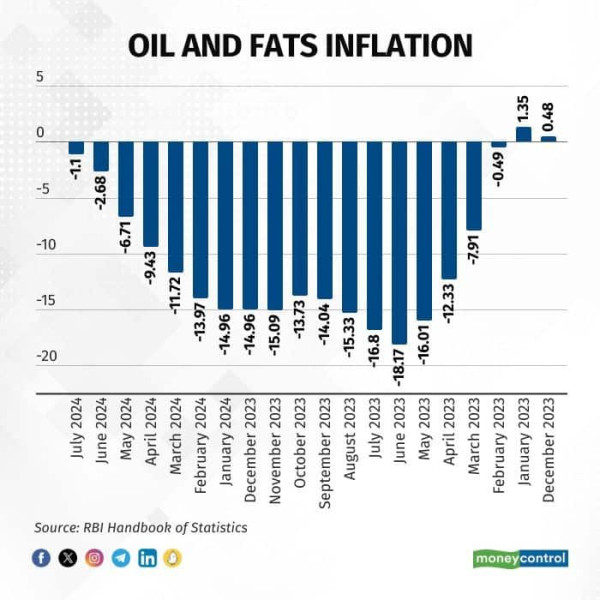Global price decline in edible oil, new crop to cushion inflationary impact of import duty hike, economists say
The recent hike in import duties on edible oil is unlikely to have a significant impact on domestic inflation. The increase in the basic customs duty on crude soybean, palm and sunflower oil from 0 to 20 per cent, which came into effect from September 14, is expected to offset the gains from the international price decline.
However, the upcoming soybean and groundnut harvests in October are anticipated to further mitigate any inflationary effects of the duty hike, economists said.
“If the increased import duties offset the gains from the international price decline, the net effect will be marginal on domestic inflation,” Sri Hari Nayudu, economist, National Institute of Public Finance and Policy (NIPFP), told Moneycontrol. The arrival of new crops would further cushion the impact, he added.
India meets up to 45 per cent of its edible oil requirements through domestic production, making it heavily reliant on “cheaper imports”. The import mechanism has made the country sensitive to global price changes. The recent increase in duty also aims to support farmers by preventing imported oil from undercutting domestic prices.
“The sharp rise seen in import duties on edible oil ahead of the festive season is expected to be inflationary in nature. It is well-intentioned to support farmers impacted by cheaper imports,” said Bidisha Ganguly, principal economist at the Confederation of Indian Industry (CII).
Despite these concerns, oil inflation has been either low or negative since February 2023, according to the data released by the Reserve Bank of India (RBI). The Ministry of Consumer Affairs has urged manufacturers of branded oils to lower their maximum retail prices (MRPs) in line with the decline in international prices.
The increased duties are part of the government’s broader strategy to balance the interests of farmers and consumers. “High import duties on edible oil have been announced to strengthen self-reliance by protecting farmers,” said Professor Lekha Chakraborty of NIPFP. She emphasised that the upcoming harvest, along with good rainfall, could result in increased oilseed production and is likely to further reduce inflationary pressures.
Credit rating agency ICRA’s Senior Vice-President, Prashant Vasisht, acknowledged that import duties lead to price hikes, but he also said domestic retail prices would not have an immediate impact due to the large volume of oil imported at lower costs.
“In November, when our own production comes into the market, the supply will cushion any sharp increase in domestic prices,” N.R. Bhanumurthy, Director, Madras School of Economics, said.
While the duty hike might bring about slight increases in retail prices, economists suggest the rise will not be drastic. “There may be a spike, but not necessarily to the extent of the import duty increase,” Bhanumurthy added.
Balancing long-term import goals and inflationary pressures
India’s long-term strategy to reduce its dependence on edible oil imports includes the National Mission for Edible Oils — Oil Palm (NMEO-OP), which was launched in 2021. The focus is on increasing domestic production to achieve self-sufficiency and insulating the country from international market volatility.
M. Govinda Rao, an economist, said while the high import duty subsidies producers, it can penalise consumers by keeping prices artificially high. He also stressed the need for Indian farmers to improve productivity and competitiveness to fully benefit from government support.
The measures, including rationalising the duty structure and ensuring adequate production, aim to strike a fine balance between stabilising domestic markets and controlling inflationary pressures, he added.
